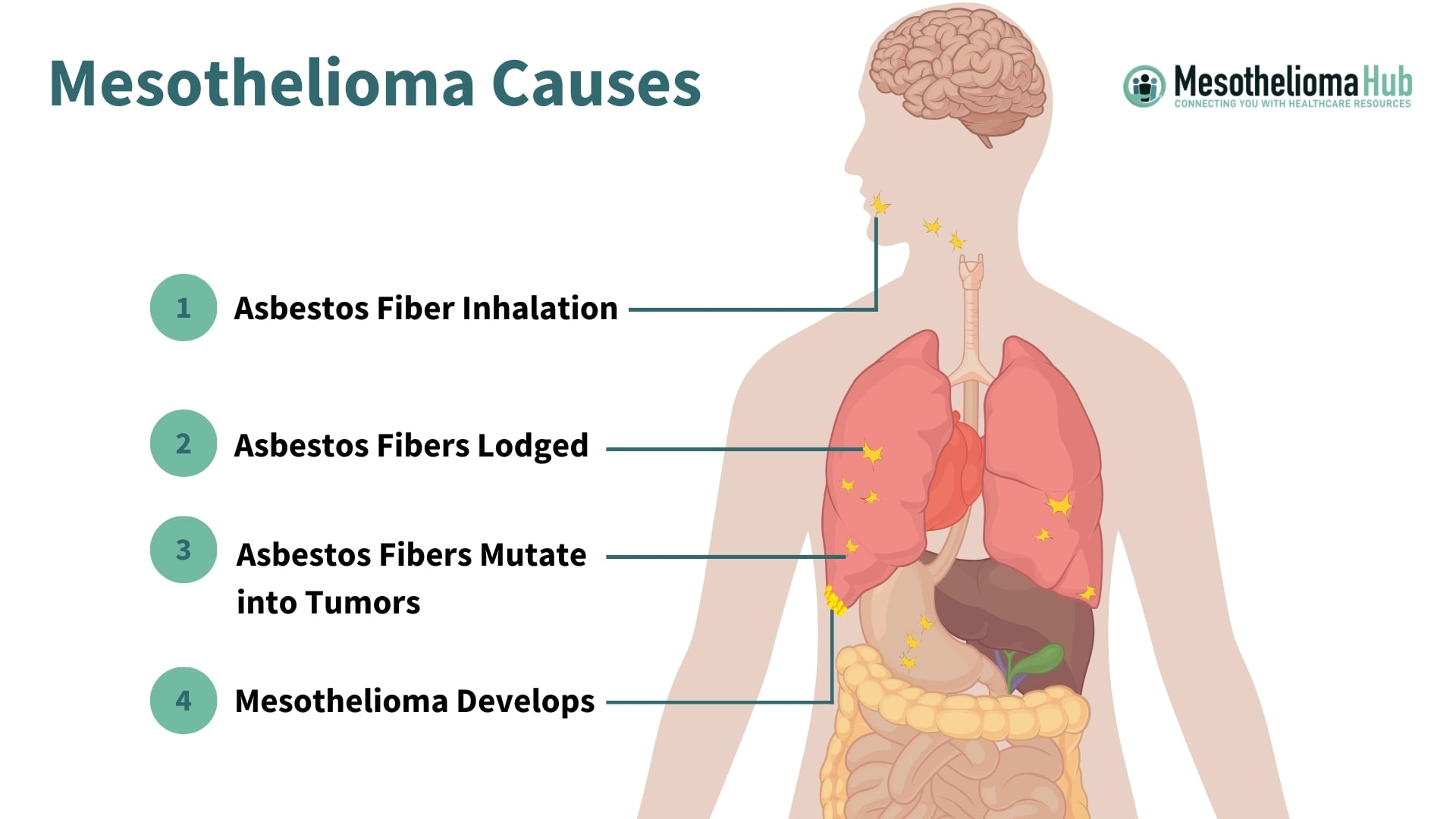
Medically Reviewed by: Muaiad Kittaneh, MD, FACP, MBA | September 9th, 2019
A ’cause’ is something that makes another thing happen. For instance, asbestos is one of the leading causes of cancer called mesothelioma. This naturally occurring material can be found in the environment and infrastructure all over the world because of its early use in construction and other industries before its toxicity was known. However, just because something caused another thing to happen doesn’t mean that it will happen every time. Not every person who is exposed to asbestos will develop mesothelioma, but usually, most people develop mesothelioma because of prolonged asbestos exposure.

How do you get mesothelioma? It is caused by asbestos exposure. Asbestos is a group of naturally occurring, fibrous minerals and the most likely source of mesothelioma. Due to its durable, fire-resistant nature, it was widely used throughout the 20th century in a number of industrial, military, commercial, and residential applications, peaking in popularity during World War II.
Eventually, in 1977, the International Agency for Research on Cancer deemed asbestos a Group 1 carcinogen (i.e., cancer-causing substance). Since then, most new uses of the material have been phased out of the U.S.
Nonetheless, mesothelioma is still a concern due to its long latency period – the time between exposure to the carcinogen and the onset of symptoms. This is mainly due to risks like the amount and duration of exposure. It often takes 20–50 years for the symptoms of mesothelioma to appear, so those who were exposed decades ago are still at risk. Many buildings were constructed using this fiber as insulation, so it’s also possible to become exposed during demolitions, renovations, or natural disasters.
Because of its widespread use over decades, millions of Americans may have been exposed to asbestos unknowingly, either directly or indirectly, through secondhand exposure. So, what causes mesothelioma other than asbestos? Is asbestos the only cause of mesothelioma? While other factors, such as radiation, erionite, zeolites (another group of minerals similar to asbestos), and the SV40 virus have been linked to mesothelioma, this particular mineral remains the common substance linked to this form of progressive cancer.
When asbestos is disturbed, its fibers become airborne and can enter the body in two ways: inhalation or ingestion. Similar to getting a splinter in your skin, the fibers lodge into the mesothelium – the lining of the chest, heart, and stomach cavities. Over time, the fibers irritate the tissue, causing damage and inflammation. This results in the formation of scar tissue, which, in some cases, leads to the development of malignant mesothelioma tumors. The toxic fiber is also linked to other illnesses, including asbestosis, lung cancer, and ovarian cancer.
There are six forms of asbestos, all of which are proven causes of mesothelioma. The two most commonly used forms are chrysotile and amphibole.
Among the group, chrysotile (sometimes referred to as white or curly asbestos) is the most common type. Amphibole (sometimes called brown asbestos) has straight fibers and is broken into two subgroups: crocidolite and amosite.
A number of everyday products may contain asbestos, including:
The early symptoms of mesothelioma often include a persistent cough, chest or abdominal pain, shortness of breath, and fatigue. These symptoms usually worsen as the cancer metastasizes or spreads. Often, diagnoses are delivered at stage 3, as symptoms at this stage become difficult to ignore and typically require treatment. Hoarseness, coughing up blood, and weight loss are indicators that mesothelioma may be spreading to other organs in the body.
If you think you may have been exposed to asbestos or are showing any symptoms, contact your doctor right away to receive a diagnosis and possibly begin cancer treatment. Because of the aggressive nature of mesothelioma, early detection can greatly improve your prognosis.
Our team of authors collaborates with the advocate team, focusing on writing about asbestos exposure and mesothelioma to spread awareness. They are dedicated to supporting families within the mesothelioma community.

Dr. Muaiad Kittaneh, MD, FACP, MBA, is a medical oncologist and assistant professor at Loyola University of Chicago. His journey in healthcare includes Internal Medicine training at Advocate Christ Medical Center/University of Illinois of Chicago, where he excelled as Chief Resident. Dr. Kittaneh further honed his expertise at the University of Miami.
Dr. Kittaneh has conducted extensive research and assisted in many clinical trials. His notable contributions have been published in journals across the United States, which focus particularly on breast, melanoma, and gastrointestinal cancers. As an expert medical reviewer, Dr. Kittaneh plays a crucial role in shaping and evaluating Mesothelioma Hub’s content, ensuring accuracy and relevance in the field.
Occupational Safety and Health Administration. (2012). Asbestos. Retrieved on July 25th, 2018, from https://osha.gov/SLTC/asbestos/
American Cancer Society. (2018). Signs and Symptoms of Mesothelioma. Retrieved on July 25th, 2018, from https://cancer.org/cancer/malignant-mesothelioma/detection-diagnosis-staging/signs-symptoms.html
Mayo Clinic. (2019). Mesothelioma. Retrieved on July 25th, 2018, from https://mayoclinic.org/diseases-conditions/mesothelioma/diagnosis-treatment/drc-20375028
U.S. Department of Veterans Affairs. (2015). Asbestos and Mesothelioma. Retrieved on July 25th, 2018, from https://boston.va.gov/services/surgical/Asbestos_and_Mesothelioma.asp
American Cancer Society. (2018). Risk Factors for Malignant Mesothelioma. Retrieved on July 25th, 2018, from https://cancer.org/cancer/malignant-mesothelioma/causes-risks-prevention/risk-factors.html
American Cancer Society. (2018). What Causes Malignant Mesothelioma? Retrieved on July 25th, 2018, from https://cancer.org/cancer/malignant-mesothelioma/causes-risks-prevention/what-causes.html